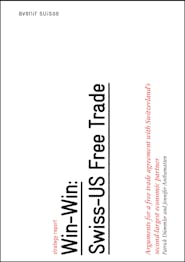Concluding free trade agreements is the declared goal of the US administration. It remains committed to working with like-minded countries to promote fair market competition, and its official trade policy agenda states that such nations “will find a true friend and ally” in the administration. However, the US has not yet been able to reach an agreement with the European Union (EU), and the trade conflict with China is mounting. Switzerland, for its part, is feeling the effects as the World Trade Organization loses significance: multilateral trade liberalization has slowed considerably, and an agreement with the country’s biggest trading partner, the EU, is at stake. Patrick Dümmler, Senior Fellow and co-author of the new Avenir Suisse study, emphasizes that “the signs for a deal between the US and Switzerland are better than they have been for a long time.”
The two countries are already closely intertwined at an economic level. “Overall, over 700,000 jobs – 450,000 of them in the US and 260,000 of them in Switzerland – are directly dependent on bilateral trade in goods and services as well as foreign direct investment,” explains Jennifer Anthamatten, Senior Researcher and co-author of the report. There is more than CHF 400 billion in direct investments on both sides of the Atlantic. A deal would be a significant gain for the US and Switzerland. According to estimates, five years after an agreement came into force, 27,500 additional jobs could be expected in the US (equivalent to four times the headcount of Hawaiian Airlines, for example) and 13,500 in Switzerland.
The trade in goods could be significantly increased. In addition to tariff cuts, the biggest advantage for companies would be legal certainty: Switzerland is the tenth-most-important export market for US goods and services, while the US is already the second-biggest trading partner for Switzerland. A free trade agreement with Switzerland would be an opportunity for US companies such as car manufacturers and entrepreneurial service providers to sell innovative products to an affluent segment of consumers. The US is the second-most important-investor in Switzerland, while Switzerland ranks a remarkable seventh in the list of investors in the US, with a volume of investment three times higher than China, India, and Mexico together.
Switzerland and the US are “sister republics” and share the same values in terms of the rule of law, freedom, democracy, and the free market. The currently intensified exchange between Switzerland and the United States at the political and administrative level would be an excellent opportunity to enter into official negotiations on a free trade agreement. “Now it’s time for a deal”, says Avenir Suisse director Peter Grünenfelder.





